{
"authors": [
"Mei Ying Gechlik (Veron Hung)"
],
"type": "event",
"centerAffiliationAll": "dc",
"centers": [
"Carnegie Endowment for International Peace"
],
"collections": [],
"englishNewsletterAll": "asia",
"nonEnglishNewsletterAll": "",
"primaryCenter": "Carnegie Endowment for International Peace",
"programAffiliation": "AP",
"programs": [
"Asia"
],
"projects": [],
"regions": [
"East Asia",
"China"
],
"topics": [
"Democracy"
]
}
The Chinese Communist Party's Leadership and Judicial Independence
Wed, October 29th, 2003
IMGXYZ337IMGZYXProfessor Li Yayun, Carnegie's Kimsey Scholar, presented her thoughts on the influence of the Chinese Communist Party leadership on judicial independence in the People's Republic of China (China). Professor Li's seminar was the culmination of her three-months of research at Carnegie's China Program.
Professor Li came to Carnegie from the Department of Politics and Law at the Central Party School of Beijing where she has been training senior members of the Chinese Communist Party (CCP) for 18 years. Dr. Veron Hung, Associate of Carnegie's China Program, served as moderator and translator while Professor Li addressed a large audience of China-related professionals and scholars in Mandarin Chinese.
After Dr. Minxin Pei, Co-director of Carnegie's China Program, extended his thanks to the Kimsey Foundation for funding Professor Li's visit to Carnegie, Professor Li outlined her seminar into four parts. First, she introduced the formal Chinese Communist Party policy concerning the relationship of the CCP and the judiciary. Second, Professor Li identified the ways in which the CCP interferes with the judiciary. Third, the causes of CCP interference in the judiciary were explained. Finally, Professor Li suggested remedial measures for enhancing the independence of the judiciary from the CCP.
Professor Li explained that the policies of the CCP are formally subordinate to the law of China. According to both the Charter of the CCP and the Chinese Constitution, the CCP must operate within the bounds of the constitution. In theory, the CCP may guarantee that court leaders adhere to the law by controlling the nomination process for judges.
In cases where the existing law does not suitably address an issue, there are two solutions. First, the judges involved in the case may suspend the case to wait for the National People's Congress to enact new legislation or seek comments or instructions from the Supreme People's Court. Additionally, the policies of the CCP may be used for guidance.
The CCP Charter passed by the 16th Party Congress offers guidelines for the formulation of CCP policies, which Dr. Hung translated as the "Three Conducives." These guidelines emphasize that CCP policy should be conducive to developing a society's productivity, strengthening the state's power, and improving the people's standard of living.
Following her description of the formal legal and policy stipulations, Professor Li identified ways in which local CCP organizations limit the independence of the judiciary. Professor Li illustrated a number of the methods of interference by the CCP with specific examples drawn from her own experience as scholar and legal practitioner in China.
Foremost among the way in which CCP organizations influence the judiciary is the participation of the CCP committees in handling and even deciding some specific cases. In particular, the political-legal committees are responsible for coordinating the relationships among the organs of public security, courts, and procuratorates. Formally, the political-legal committees are meant to "supervise" the work of the various legal organs on "major and complex" cases. Nevertheless, the "supervision" of the political-legal committee often equates with adjudication.
Additionally, in cases where senior CCP leaders are charged with economic crimes, such as corruption related charges, the litigation only commences following an investigation by the Discipline Inspection Committee. In some cases, the Discipline Inspection Committee may decide the case.
Finally, local CCP committees may appoint, dismiss, or rotate leading cadres in courts and are likely to intervene on behalf of the local government in cases that affect local economic interests. To illustrate the latter point regarding local economic interests, Professor Li mentioned the case of a local entrepreneur from Hebei province whose highly profitable enterprise was appropriated by the county government. When the owner rejected this arrangement, the county government used its influence at the local bank to bankrupt the enterprise and indicted the owner on charges of corruption and misuse of public revenue. Following a verdict of not guilty, the presiding judge was demoted and an appeal was ordered. Despite the protest of the appellate judge, the local CCP political-legal committee judged the defendant guilty. Professor Li emphasized how these cases of intervention by the CCP undermined judicial independence.
Elaborating on the methods of interference by the CCP, Professor Li highlighted the causes of such interference. She suggested that there are both social and institutional causes. Regarding the social causes, Professor Li suggested that some CCP members do not understand the proper means of leadership and think that intervening in specific cases is appropriate. Additionally, she mentioned that society often considers CCP interference reasonable and beneficial, providing opportunities to "right the wrongs."
The institutional causes for interferences were quite compelling. Professor Li noted that there are no provisions in the constitution, laws, or CCP Charter punishing CCP members for interfering in judicial work. Most importantly, local governments and local CCP committees control the personnel and financial arrangements of the local courts. Appointment and dismissal of judges, and provision of salaries are determined by local government and CCP committees. Finally, the judiciary is managed like an administrative agency in that junior judges must listen to the opinions of chief judges and the presidents of courts.
Despite thorough and detailed descriptions of the manifestations and underlying causes of CCP interference in the judicial process, Professor Li spent a good deal of time discussing current and potential legal reforms. She suggested the CCP Charter and disciplinary rules should explicitly provide for the punishment of CCP members who interfere with the judiciary in violation of established rules. Furthermore, Professor Li suggested that China's Criminal Law should be amended to make CCP officials who interfere with the judiciary criminally responsible.
Professor Li explained suggestions of the President and Vice-president of the Supreme People's Court to redesign the jurisdiction of courts to limit the ability of local CCP and government officials to interfere in the judicial system. Specifically, she described proposals to redesign High Court jurisdictions to span multiple provinces and to merge intermediate courts to establish District Court's with jurisdiction over multiple cities.
Additionally, the Supreme People's Court should be empowered to send teams of experienced judges to establish "circuit tribunals" to adjudicate particularly difficult disputes that require special handling. The judges of district courts and circuit tribunals should be nominated by the Supreme People's Court and appointed by the National People's Congress.
Professor Li suggested that China's court system should be led by the Central Political-legal Committee, requiring the reorganization of the local political-legal committees.
Professor Li's final suggestion for remedial measures to limit the influence of the CCP on judicial independence reflected her own scholarly background. She suggested strengthening legal education and training for high-rank party members. Demonstrating how legal reforms were already being implemented, Professor Li explained how legal education has expanded at the Central Party School, the primary institution for training CCP officials, despite the reduction of many other programs at the same institution. She also noted that the school is seeking more opportunities to engage in academic exchanges with foreign universities.
On an optimistic note, Professor Li ended her speech with the comment that she expected much progress in the area of judicial reform despite the current challenges to judicial independence in China.
Following the speech and enthusiastic applause, Professor Li took the time to field a number of difficult questions. One local Washington lawyer inquired about the transparency of judicial procedures. Professor Li suggested that the Chinese media had broad access to trials in China. She questioned whether the media actually had too much access to trials, suggesting that, in some cases, media coverage negatively influenced the outcome of trials.
A representative from Amnesty International inquired about the protection of property rights for US companies. Professor Li responded by emphasizing that there was little to worry about regarding the property rights of foreign firms given that the Chinese government has placed economic development on top of its list of priorities.
Carnegie does not take institutional positions on public policy issues; the views represented herein are those of the author(s) and do not necessarily reflect the views of Carnegie, its staff, or its trustees.
